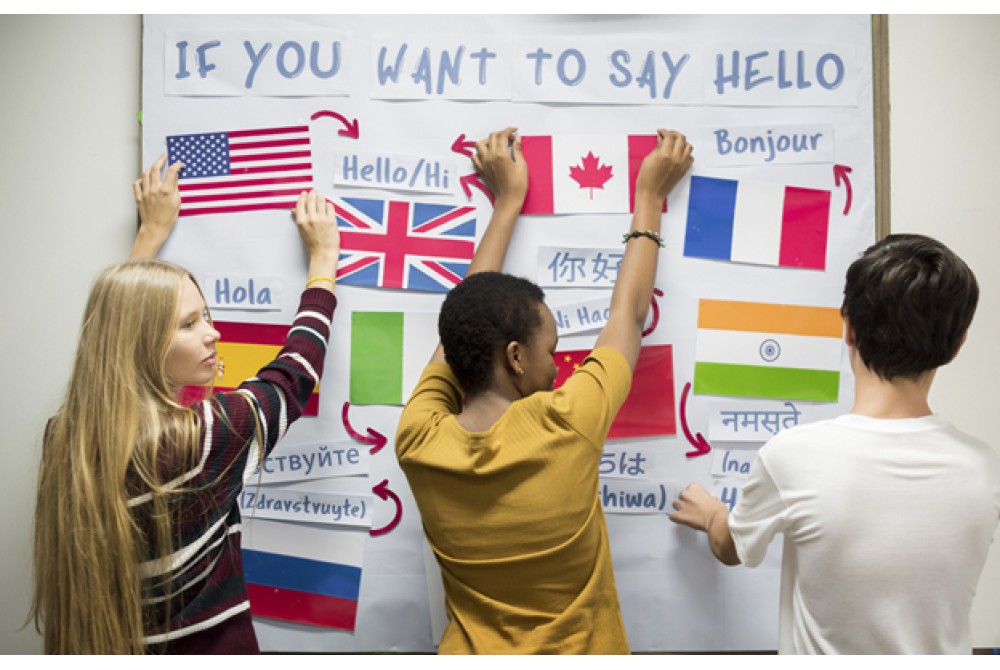If you’re like us and fascinated by the many languages of the world, you might have thought about learning two new languages concurrently. Twice the knowledge in half the time – why not?
Except we only have 24 hours a day, and learning a new language as an adult is a lot harder.
But that doesn’t mean it’s not possible to learn two languages at the same time. Read on to find out about the amazing power of the human brain and its ability to learn more than one new language at a time.
The flexibility of our brains
Never underestimate the power of the human brain. It has the power to learn and analyse multiple things at the same time. Think about it – babies are exposed to new things everyday, and their brains are tiny. So, imagine what your bigger adult brain can do when it is exposed to the wonders of multi-tasking.
Studies have shown that adults who learn a new skill or multiple skills at the same time increase their cognitive ability across a broad and significant range1.
Our brains are adept at handling multiple languages at the same time; it records and stores the languages you learn and know in the same region, resulting in overlapping connections with translations, words that sound the same, and words with shared meaning2.

Tips for learning more than one new language at a time
Learning two languages at the same time is very possible – but it requires dedication, patience, and hard work. Here are some tips to power through the process:
- Pair difficult languages with easy languagesIf you are a native English speaker, chances are, some languages like Arabic are harder to grasp, as compared to something like Spanish. You might want to think about pairing an easy language with a difficult language – obvious reason being you don’t want to burn out.
- Learn languages that are differentWhile you want to pair difficult and easy, try to also stick to languages that are totally different, like Spanish and Japanese. Learning two similar languages (like Spanish and Italian) at the same time can be confusing. For many Singaporeans, a good combination would be Korean and Spanish.
- Learn the same topics in both languages at the same timeIn a way, you are priming your brain. For example, if you are learning Spanish and Mandarin at the same time, you can think of one word in English and automatically know what it is in Mandarin and Spanish. When you think of the word dog in Spanish, you will automatically think of the word for dog in Mandarin.
- Set realistic expectationsThe different the language, the steeper the learning curve. There are pros and cons to studying either two languages that are similar (like Korean and Japanese) or two languages that are polar opposites (such as Italian and Korean). Set realistic, tangible goals for yourself, such as mastering 20 words by the end of two weeks, or using certain verbs by the end of a month.
- Make it funThere are several benefits of learning new languages in a group setting. Besides practicing with each other, in a class you can learn from each other’s mistakes. At Lingo we have small group classes for over 20 languages and corporate packages available too.
- Practice, practice, practicePractice is key! Ask any professional sportsman or sportswoman and they will tell you the same. Some ways to practice outside of the classroom include watching your favourite sitcom in the language you’re learning, speaking the language with your classmates, or borrowing a book in that language. Learning new languages is not like memorising a formula and applying it where necessary; the new words in the language need to be connected to emotions and memories.
- Go to a good language schoolA good teacher makes a world of difference. Here at Lingo, our teachers are qualified and experienced native speakers who ensure every student gets equal amounts of attention. All classroom materials are in-house and customised.

If you are keen on learning more than one language at the same time but are unsure about which two languages you should select, our qualified and experienced teachers will be able to guide you on making the right decision.
Contact us to let us know what you’re looking for and us folks from Lingo School of Knowledge will be in touch as soon as possible.
References:
- Shirley Leanos, E. K.-H. (2020). The impact of learning multiple real-world skills on cognitive abilities and functional independence in healthy older adults. Journals of Gerontology : Psychlogical Sciences, 1155-1169.
- Blanco, C. (2021, May 19). duolingo blog. Retrieved from Can you learn two languages at the same time?: https://blog.duolingo.com/can-you-learn-two-languages-at-the-same-time/
- Brainscope Academy. (2022). Brainscope > Academy. Retrieved from Can you learn two languages at once? (Maybe, and here’s how): https://www.brainscape.com/academy/learn-two-languages-at-once/

